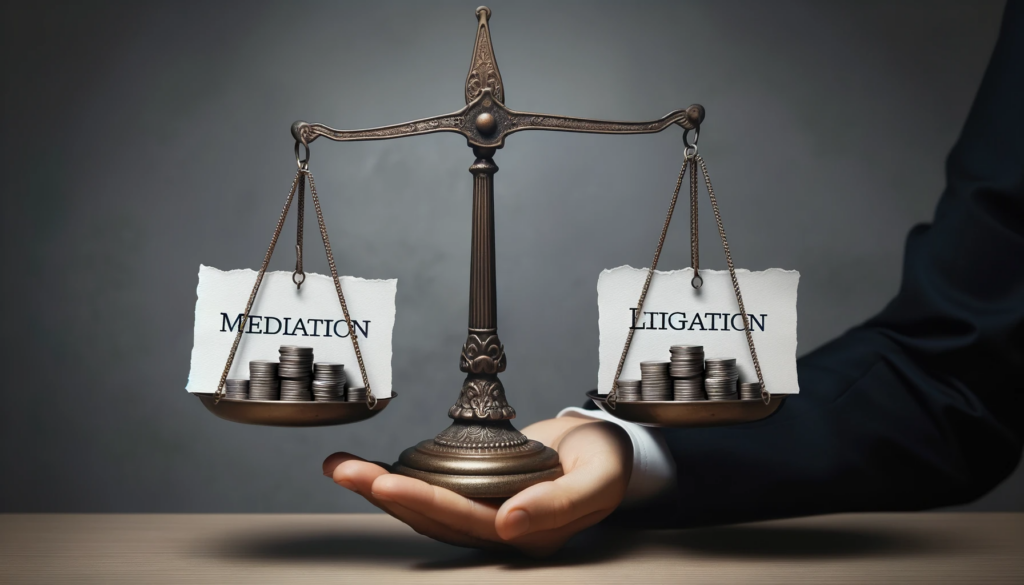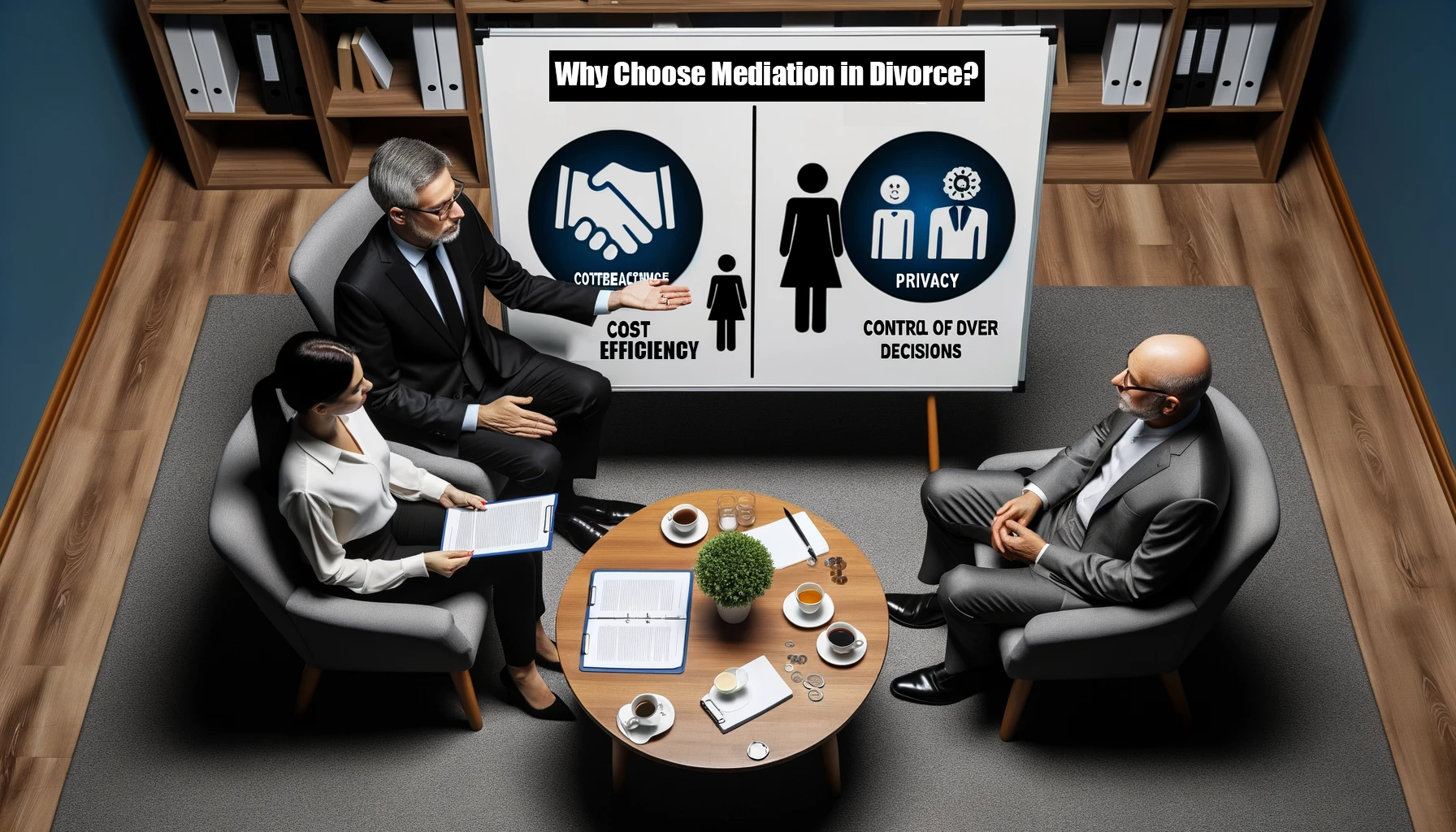Divorce can be a difficult and emotional process, and traditional litigation can often exacerbate the stress and strain involved. This is where mediation in divorce comes in – an alternative method that has become increasingly popular in the UK due to its many benefits.
Mediation involves a neutral third-party mediator who helps couples discuss and resolve their disputes amicably. Mediation can lead to a smoother, faster, and more cost-effective separation, and also allows couples to have more control over the outcome of their divorce.
In this UK guide to mediation in divorce, we will explore the concept of mediation, its benefits, the mediation process, legal considerations, and much more.


Key Takeaways
- Mediation in divorce is an alternative method to traditional litigation that has become increasingly popular in the UK.
- It involves a neutral third-party mediator who helps couples resolve their disputes amicably.
- Mediation can lead to a smoother, faster, and more cost-effective separation.
- Couples who choose mediation can have more control over the outcome of their divorce.
- This UK guide will explore the concept of mediation, its benefits, the mediation process, legal considerations, and much more.
Understanding Mediation in Divorce
Mediation is a process that helps couples facing separation or divorce to reach mutually agreeable solutions without involving an adversarial court process. It is a voluntary, confidential, and non-binding process that relies on open communication and cooperation between the parties involved.
A mediator is a neutral third party who facilitates a discussion between the couple and assists them in reaching a resolution that meets their needs and interests. The mediator does not make decisions or impose solutions but helps to explore options and generate proposals that the parties can agree to.
During mediation, both parties have the opportunity to express their concerns and preferences in a respectful and non-judgmental environment. The mediator helps to identify common ground and areas of disagreement and encourages the parties to find creative solutions that address their interests and concerns.
Mediation can be particularly useful in situations where the parties have an ongoing relationship, such as co-parenting, or where they want to maintain control over the outcome of their separation or divorce. It can also be less stressful and time-consuming than going to court and can be more cost-effective.
Benefits of Mediation in Divorce
By engaging in mediation, couples can benefit from:
- Greater control over the outcome: Rather than having a judge make decisions that may not align with their wishes, couples can work together to find solutions that are mutually agreeable and tailored to their specific needs.
- Less conflict: Mediation can help reduce tension and hostility between parties, allowing for a more amicable and respectful separation or divorce.
- Faster resolution: Since mediation can be scheduled more quickly than a court hearing, it can lead to a faster resolution of the dispute.
- Cost savings: Mediation is generally less expensive than going to court, as it does not require extensive legal fees or costly delays.
- Confidentiality: Mediation is a private and confidential process, which can help maintain the privacy and dignity of the parties involved.
Understanding the benefits of mediation can help couples make an informed decision about whether it is the right approach for them. By choosing mediation, they can take control of the situation and work towards a mutually agreeable solution to their separation or divorce.
Benefits of Mediation in Divorce
Mediation is an alternative method of resolving disputes during a divorce that offers various benefits compared to traditional litigation. Here are some of the advantages of choosing mediation:
- Open communication: One of the primary advantages of mediation is that it encourages open communication between the parties involved. Mediation sessions provide a platform for each party to express their concerns and desires, while the mediator facilitates a constructive dialogue to reach an agreement that works for both parties.
- Encourages cooperation: Mediation promotes a cooperative approach to resolving disputes. Instead of viewing the other party as an adversary, mediation encourages both parties to work together to find a solution that benefits everyone involved.
- More control over the outcome: Mediation allows both parties to have more control over the outcome of their divorce. Since they actively participate in the decision-making process, they are more likely to be satisfied with the outcome and adhere to any agreements reached during mediation.
- Positive impact on emotional well-being: Divorce can be emotionally draining, and litigation often exacerbates the stress and tension involved. Mediation, on the other hand, can help to reduce hostility and create a more amicable separation, which can have a positive impact on the emotional well-being of both parties involved.
- Cost-effective: Mediation can potentially save couples significant expenses related to legal fees, court costs, and lengthy legal battles. Since mediation is typically faster and more efficient than litigation, it can lead to a smoother and more cost-effective separation.
By choosing mediation in divorce, couples can achieve a mutually agreeable settlement and minimize the negative impact of divorce on their lives. Mediation can be particularly beneficial for couples with children, as it enables them to co-parent effectively and maintain a healthy relationship after the divorce.
Finding a Mediator
Finding the right mediator for your divorce case is critical to ensuring a successful outcome. Here are some tips to help you find a qualified mediator.


Accreditation and Experience
Look for mediators who are accredited by recognized organizations such as the Family Mediation Council or the Civil Mediation Council. These accreditations ensure that the mediator has received proper training and adheres to professional standards. Additionally, consider the mediator’s experience in family law and mediation. It’s best to choose someone who has significant experience in both areas.
Specialization
Consider a mediator who specializes in family law and divorce mediation. They will have a deeper understanding of the legal and emotional complexities involved in divorce proceedings.
Recommendations
Ask for recommendations from friends, family members or your solicitor. Personal recommendations can often provide valuable insights into the mediator’s approach and success rate.
Research Online
Search online directories for mediators in your area, and review their profiles carefully. Check for reviews or testimonials from previous clients to gauge their effectiveness.
Initial Consultation
Once you have shortlisted some mediators, arrange for an initial consultation. This meeting will allow you to ask questions about their approach, fees, and the expected duration of the mediation process. It’s also an opportunity to assess their compatibility and communication style.
Overall, finding a qualified mediator with the right skills, experience, and approach can significantly increase the chances of a successful mediation process. Take your time, do your research, and choose someone who puts your interests first.
The Mediation Process


The mediation process in divorce typically involves several stages. These are designed to ensure that both parties are given ample opportunity to express their respective positions, identify key areas of disagreement, and work towards finding mutually acceptable solutions. Here is a brief overview of the mediation process:
- Initial Consultation: This is usually the first stage of the mediation process. During this stage, the mediator meets with each party individually to discuss the case’s details, explain the mediation process, and identify any potential conflicts of interest. The mediator may also assess the parties’ suitability for mediation and answer any questions they may have.
- Joint Sessions: Once both parties have agreed to participate in mediation, joint sessions are scheduled. During these sessions, the mediator facilitates discussions between the parties and encourages them to explore potential solutions. Both parties are encouraged to communicate openly and honestly while actively listening to the other side’s perspective. The mediator helps to keep the discussion focused and productive by summarizing the parties’ positions and identifying areas of agreement and disagreement.
- Negotiation and Settlement: Once the parties have identified potential solutions to their disagreements, they work towards reaching a mutually acceptable settlement. The mediator may help the parties to refine their proposals and identify areas of compromise. Once a settlement has been reached, the mediator will typically draft a summary of the agreement, which both parties will review and sign.
Throughout the mediation process, the mediator acts as a neutral third party, facilitating communication between the parties and helping them to work towards a mutually acceptable outcome. The mediator does not make decisions or impose solutions but instead encourages the parties to reach their agreements voluntarily.
The mediation process can vary in length, depending on the complexity of the issues involved, the parties’ willingness to compromise, and the availability of the parties and the mediator.
The Role of Legal Advisors
Legal advisors are not typically present during mediation sessions. However, both parties may choose to seek independent legal advice before, during, or after the mediation process. Legal advisors can provide guidance on the legal implications of proposed solutions and ensure that mediated agreements comply with legal requirements.
It is important to note that seeking independent legal advice does not mean that the parties are no longer participating in mediation. Instead, legal advisors can help to ensure that the parties make informed decisions and reach agreements that are in their best interests.
Legal Considerations in Mediation


During mediation, it is essential to consider the legal aspects involved in a divorce. Mediated agreements may have legal implications and consequences, so it’s vital to ensure that all parties understand the legal issues surrounding the case. Here are some of the legal considerations to keep in mind:
- Seek Independent Legal Advice: It’s essential to seek independent legal advice before, during, and after the mediation process. Independent legal advice can help ensure that all parties understand the law and their legal rights and responsibilities.
- Compliance with the Law: Mediation must comply with the law. The mediator should be familiar with the relevant legal requirements and be able to advise the parties accordingly.
- Enforceability of Agreements: Not all mediated agreements are legally binding, so it’s important to understand the enforceability of any agreement reached during mediation. A mediated agreement may need to be incorporated into a consent order or a binding financial agreement to make it legally enforceable.
- Legal Representation: While legal representation is not required during mediation, it can be helpful to have a lawyer present to provide legal advice and ensure that the parties understand the legal implications of any decisions made during mediation.
It’s important to note that mediation cannot provide legal advice, and mediators are not legal representatives. Therefore, parties should seek independent legal advice before and after the mediation process.
It’s also worth considering the benefits of involving legal professionals effectively in the mediation process. Legal advisors can help parties understand the legal implications of any decisions made during mediation and can assist in ensuring that the final agreement is legally binding.
Cost-effectiveness of Mediation
One of the primary reasons why mediation in divorce is becoming increasingly popular in the UK is its cost-effectiveness. Compared to traditional litigation, mediation can significantly reduce the expenses associated with divorce proceedings.


Mediation sessions are typically less expensive than court appearances, and couples can often reach a resolution in fewer sessions. This means that couples spend less money on legal fees and court costs, making mediation a more affordable option for many.
Furthermore, mediated agreements can often be reached more quickly than court orders, saving couples both time and money. The less time spent on legal proceedings, the more time couples can spend rebuilding their lives post-separation.
Another cost-saving benefit of mediation is that it can potentially minimize the negative financial impact of divorce on both parties involved. By reaching mutually agreeable settlements, couples can avoid lengthy and costly legal battles and focus on starting anew with a fair and equitable financial outcome.




Remember!
Choosing mediation in divorce can be a highly cost-effective option for couples seeking an amicable resolution to their disputes. By minimizing expenses and potentially reducing the negative financial impact of divorce, mediation can help couples move on from the end of their relationship with greater ease and financial stability.
Mediation vs. Litigation
Divorce is a challenging time for everyone involved, and the decision on how to approach the proceedings can have a significant impact on the outcome. Choosing between mediation and litigation is a crucial decision, and it is essential to understand the key differences between these two methods.


Mediation is a process that focuses on resolving conflicts in an amicable and cooperative manner. Mediation allows both parties to communicate openly and work towards a mutually agreeable solution under the guidance of a mediator. On the other hand, litigation is a legal process where both parties submit their disputes to a court that makes a binding decision.
Mediation in Divorce allows couples to have more control over the outcome of their disputes and encourages cooperation. In contrast, litigation can lead to a court decision that may not align with the interests of either party and can result in a prolonged legal battle.
Differences in Level of Control
One key distinction between mediation and litigation is the level of control that both parties have over the final outcome. During mediation, both parties are involved in the decision-making process and have more control than they would in a court case. In contrast, litigation hands over control to a judge who makes the final decision, which both parties must abide by, regardless of their preference.
Differences in Privacy
Mediation also offers greater privacy than litigation. During mediation, all discussions and decisions are confidential and remain private. In contrast, court proceedings are open to the public, which can be uncomfortable and damaging for both parties.
Differences in Impact on Relationships and Children
The impact of mediation and litigation on relationships and children is another crucial factor. Mediation aims to promote cooperation and understanding between both parties, which can lead to a better post-divorce relationship. In contrast, litigation can cause further conflict and damage relationships, leading to long-lasting negative effects on children.


Ultimately, the choice between mediation and litigation depends on the unique circumstances of the divorce case. However, it is essential to consider the differences in control, privacy, and the impact on relationships and children when making a decision.
Conclusion
Choosing mediation in divorce can be a wise decision for couples who want to achieve an amicable separation. The benefits of mediation include faster resolution, reduced costs, and increased control over the outcome. Mediation also promotes open communication, encourages cooperation, and minimizes the emotional impact of divorce.
It’s important to find a qualified mediator who can guide you through the process and ensure a fair outcome. Seeking independent legal advice is also recommended to ensure compliance with the law and the enforceability of mediated agreements.
Compared to traditional litigation, mediation has proven to be a cost-effective alternative. Couples may benefit financially by reaching mutually agreeable settlements without lengthy court battles or high legal fees. Additionally, mediation can help preserve relationships and minimize the impact on children.
When comparing mediation to litigation, it’s clear that mediation offers more control, privacy, and potential for a positive outcome. However, it’s important to consider the individual circumstances of your case and choose the best approach for your specific needs.




Remember!
Mediation in divorce is a valuable method for resolving disputes amicably. By considering the benefits of mediation and finding a qualified mediator, couples can achieve a smoother, quicker, and cost-effective separation, while minimizing the emotional impact on themselves and their families.


FAQ
Why should I choose mediation in divorce?
Mediation in divorce offers several benefits such as a smoother, faster, and cost-effective separation process. It allows couples to resolve disputes amicably and have more control over the outcome of their divorce.
What is mediation in divorce?
Mediation in divorce is a process where a neutral third party, known as a mediator, helps couples negotiate and reach agreements on various aspects of their divorce, such as child custody, division of assets, and spousal support.
What are the benefits of mediation in divorce?
Mediation in divorce promotes open communication, encourages cooperation, and can have a positive impact on the emotional well-being of both parties involved. It also provides a more cost-effective alternative to litigation and allows couples to have more control over the outcome of their divorce.
How do I find a mediator for my divorce?
When searching for a mediator for your divorce, consider factors such as accreditation, experience, and specialization. You can search for mediators through professional bodies or organizations that specialize in family mediation. It’s important to evaluate their suitability and ensure they meet your specific needs.
What is the mediation process in divorce?
The mediation process in divorce typically involves initial consultations, joint sessions where couples discuss their concerns and negotiate agreements, and a negotiation and settlement phase. It’s important to document any agreements reached during mediation to ensure clarity and enforceability.
What legal considerations should I keep in mind during mediation?
During mediation, it’s important to seek independent legal advice to understand your rights and obligations. Ensure compliance with the law and understand the enforceability of mediated agreements. You can involve legal professionals effectively in the mediation process to ensure proper guidance and protection.
Is mediation cost-effective compared to litigation?
Yes, mediation is often more cost-effective than traditional litigation. It can potentially save couples significant expenses related to legal fees, court costs, and lengthy legal battles. Through mediation, couples can reach mutually agreeable settlements, minimizing financial strain.
What is the difference between mediation and litigation in divorce?
Mediation and litigation are different methods for resolving divorce disputes. Mediation allows couples to have control over the outcome, promotes open communication, and emphasizes cooperation. Litigation involves going to court, where a judge makes decisions on behalf of the couple, which may result in a more adversarial process.
How does mediation in divorce benefit relationships and children?
Mediation in divorce can benefit relationships and children by fostering a more amicable and cooperative environment. It promotes understanding and mutual agreement, reducing conflict and potentially minimizing the negative impact on relationships and children involved.





Leave a Reply